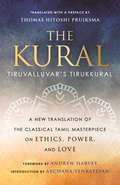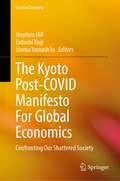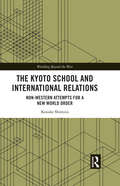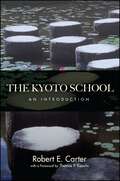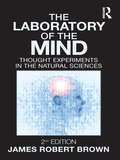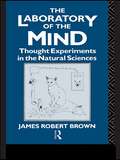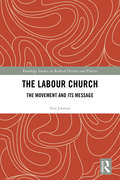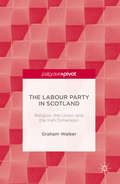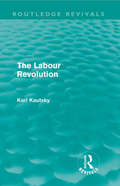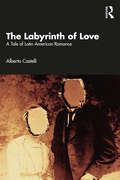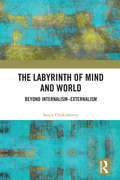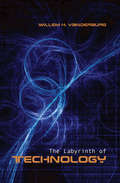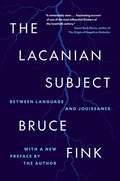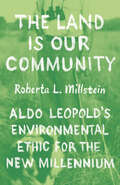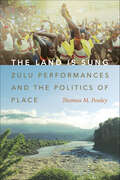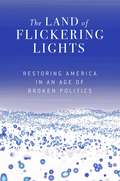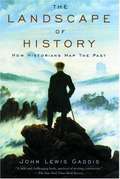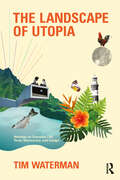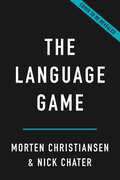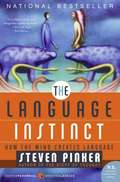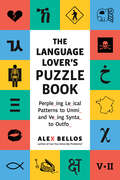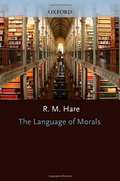- Table View
- List View
The Kural: Tiruvalluvar's Tirukkural
by Thomas Hitoshi PruiksmaA new translation of the classical Tamil masterpiece on ethics, power, and friendship, bringing Tiruvalluvar&’s poetry and philosophy to a new generation seeking practical wisdom and spiritual sustenanceDrawing on the poetic tradition of W. S. Merwin, Wendell Berry, and William Carlos Williams, and nurtured by 2 decades of study under Tamil scholar Dr. K. V. Ramakoti, this new translation of the Kural by Thomas Hitoshi Pruiksma brings English readers closer than ever to the brilliant inner and outer music of Tiruvalluvar&’s work and ideas.Tiruvalluvar&’s Tirukkural is a masterwork of poetry and practical philosophy. On par with other world classics such as the Tao Te Ching, the Kural is a compendium of 1,330 short philosophical verses, or kurals, that together cover a wide range of personal and cosmic experience, such as—POLITICS:Harsh rule that brings idiots together—nothingBurdens the earth moreHOSPITALITY:The life that cherishes strangers each dayNever falls upon ruinFRIENDSHIP:Friendship is not a face smiling—friendshipIs a heart that smilesGREED:Those who won&’t give and enjoy—even with billionsThey have nothingAccompanying the translation is a foreword by the founder of the Institute for Sacred Activism, Andrew Harvey; an introduction by the translator and scholar Archana Venkatesan; and a &“Commentary of Notes,&” in which Pruiksma elucidates key words and shares insights from important Tamil commentaries.Rich with indelible wordplay, learning, and heart, Pruiksma&’s translation transforms the barrier of language into a bridge, bringing the fullness of Tiruvalluvar&’s poetic intensity to a new generation.
The Kyoto Post-COVID Manifesto For Global Economics: Confronting Our Shattered Society (Creative Economy)
by Stomu Yamash’ta Tadashi Yagi Stephen HillThis book, The Kyoto Post-COVID Manifesto for Global Economics (KM-PC), is a sequel to our 2018 book, The Kyoto Manifesto for Global Economics (KM-I, 2018). It further exposes the failures of a global economic regime that, based on self-interest, has led to the enormously unequal and fragmented society of today and our decreased ability to respond and recover from the critical worldwide consequences of such a regime over time — notably, climate change. At stake is our very survival beyond the twenty-first century. The fundamental tenet of this book is that our power to heal our currently fractured society lies in the depth of our humanity — in our shared human spirit and spirituality. What is sacred or of imperishable supreme value is what we can be as a human race: empowered, fulfilled individuals, living in harmony, deeply sharing and caring for one another and the environment that sustains us across our distinct cultures and worlds in which we live. Thus, the norms in our economic relations do not have to be those of self-interest that separates us, the ever-watchful distrust represented by “the deal” and immediate economic advantage for me. Instead, we can build an economic frame for our society based on mindfulness, care, mutual human benefit, and trust — on our shared humanity. Our argument was complete and we were ready to publish. But then, suddenly, from the dawning of 2020, everything changed. COVID-19 invaded and the world as we knew it simply stopped. No one saw it coming. As authors, we waited to watch and seek to understand. The result is that the book captures the COVID trauma and, against the fractures based on self-interest already visible in today’s society, assesses the impact of COVID-19 now and for the future. Focusing on a humanity-based economics is even more important now, and this book shows why.Chapter 15 is available open access under a Creative Commons Attribution 4.0 International License via link.springer.com.
The Kyoto School and International Relations: Non-Western Attempts for a New World Order (Worlding Beyond the West)
by Kosuke ShimizuThe Kyoto School and International Relations explores the Kyoto School’s challenge to transcend the ‘Western’ domination over the ‘rest’ of the world, and the issues this raises for contemporary ‘non-Western’ and ‘Global IR’ literature. Was the support of Kyoto School thinkers inevitable due to the despotism of military government, thus nothing to do with their philosophy, or a logical extension of their philosophical engagement? The book answers this question by investigating individual Kyoto School philosophers in detail. The author argues that any attempts to transcend the ‘West’ are destined to be drawn into power politics as far as they uncritically adopt and use the prevailing ontological concept of linear progressive time and dominant meta-narrative of Westphalia. Thus, to fully understand this problem, there is the need to be cautious of the power of language of Westphalia and the concept of time in IR. Aimed at students and scholars of IR theory, Japanese politics and East Asian IR in general, this book provides some introductory explanations of these academic subjects, developing a theory based on the concepts of time and language of Kyoto School philosophy.
The Kyoto School: An Introduction
by Robert E. CarterThis book provides a much-needed introduction to the Kyoto School of Japanese philosophy. Robert E. Carter focuses on four influential Japanese philosophers: the three most important members of the Kyoto School (Nishida Kitarō, Tanabe Hajime, and Nishitani Keiji), and a fourth (Watsuji Tetsurō), who was, at most, an associate member of the school. Each of these thinkers wrestled systematically with the Eastern idea of "nothingness," albeit from very different perspectives.Many Western scholars, students, and serious general readers are intrigued by this school of thought, which reflects Japan's engagement with the West. A number of works by various thinkers associated with the Kyoto School are now available in English, but these works are often difficult to grasp for those not already well-versed in the philosophical and historical context. Carter's book provides an accessible yet substantive introduction to the school and offers an East-West dialogue that enriches our understanding of Japanese thought while also shedding light on our own assumptions, habits of thought, and prejudices.
The Laboratory of the Mind: Thought Experiments in the Natural Sciences (Philosophical Issues In Science Ser.)
by James Robert BrownNewton's bucket, Einstein's elevator, Schrödinger's cat – these are some of the best-known examples of thought experiments in the natural sciences. But what function do these experiments perform? Are they really experiments at all? Can they help us gain a greater understanding of the natural world? How is it possible that we can learn new things just by thinking? In this revised and updated new edition of his classic text The Laboratory of the Mind, James Robert Brown continues to defend apriorism in the physical world. This edition features two new chapters, one on “counter thought experiments” and another on the development of inertial motion. With plenty of illustrations and updated coverage of the debate between Platonic rationalism and classic empiricism, this is a lively and engaging contribution to the field of philosophy of science.
The Laboratory of the Mind: Thought Experiments in the Natural Sciences (Philosophical Issues in Science)
by James Robert BrownThought experiments are performed in the laboratory of the mind. Beyond this metaphor it is difficult to say just what these remarkable devices for investigating nature are or how they work. Though most scientists and philosophers would admit their great importance, there has been very little serious study of them. This volume is the first book-length investigation of thought experiments. Starting with Galileo's argument on falling bodies, Brown describes numerous examples of the most influential thought experiments from the history of science. Following this introduction to the subject, some substantial and provocative claims are made, the principle being that some thought experiments should be understood in the same way that platonists understand mathematical activity: as an intellectual grasp of an independently existing abstract realm. With its clarity of style and structure, The Laboratory of the Mind will find readers among all philosophers of science as well as scientists who have puzzled over how thought experiments work.
The Labour Church: The Movement & Its Message (Routledge Studies in Radical History and Politics)
by Neil JohnsonThis book aims to unpack the core message of the Labour Church and question the accepted views of the movement by pursuing an alternative way of analysing its history, significance and meaning. The religious influences on late-nineteenth/early-twentieth-century British Socialism are examined and placed within a wider context, highlighting a continuing theological imperative for the British Labour movement. The book argues that the most distinctive feature of the Labour Church was Theological Socialism. For its founder, John Trevor, Theological Socialism was the literal Religion of Socialism, a post-Christian prophecy announcing the dawn of a new utopian era explained in terms of the Kingdom of God on earth; for members of the Labour Church, who are referred to as Theological Socialists, Theological Socialism was an inclusive message about God working through the Labour movement. Challenging the historiography and reappraising the political significance of the Labour Church, this book will be of interest to students and scholars researching the intersection between religion and politics, as well as radical left history and politics more generally.
The Labour Party in Scotland: Religion, the Union, and the Irish Dimension
by Graham WalkerThis book makes a timely contribution to our understanding of the dramatic political changes that have recently affected Scotland and thrown into doubt the country’s future position within the United Kingdom. Its focus is on the Labour Party and the loss of its traditional electoral support base. This theme is related to religion and its relevance to Scotland’s identity politics. The author examines how Labour was able to appeal across the ethno-religious divide in Scotland for many decades, before considering the impact of the new political context of devolution in the 21st century and the greater scrutiny given to the question of sectarianism in Scottish life. Walker demonstrates the role played by the sectarianism controversy in Labour’s loss of political control and its eclipse by the Scottish National Party (SNP). This book is also the first to assess the significance of the Irish dimension in Scotland’s political development, in particular the impact of the conflict in nearby Northern Ireland. It will appeal to students and scholars of Scottish and Irish politics, political science and political/electoral history, as well as the interested wider reader.
The Labour Revolution (Routledge Revivals)
by Karl KautskyFirst published in English in 1924 this ambitious work, by the famous Marxist theoretician Karl Kautsky, aims to provide nothing less than an "exposition of the methods to introduce socialism" amongst the capitalist economies of Europe in the post-World War One era. Looking back on the experiences of the German socialist movement and looking forwards to the likelihood of a Labour government in Great Britain, he discusses the problems facing a labour revolution in Europe, with particular reference to the role of the middle classes, the transitional period between capitalism and socialism, and the economic impact of a socialist revolution.
The Labyrinth of Love: A Tale of Latin American Romance
by Alberto CastelliThis book studies the various narrative shades of love in twentieth-century Latin American fiction. It examines writings by Isabel Allende, Roberto Arlt, García Márquez, and Mario Vargas Llosa. The author provides a close textual reading of each novel and discusses how humans make sense of their lives through love. He shifts the focus of these writings from political violence and historical disillusionment to the illusion of love.An important contribution to Latin American literary criticism, this book will be of interest to students and scholars of literature, history, Latin American literature, philosophy, ethics, aesthetics, comparative literature, and sociology.
The Labyrinth of Mind and World: Beyond Internalism–Externalism
by Sanjit ChakrabortyThis book carries forward the discourse on the mind’s engagement with the world. It reviews the semantic and metaphysical debates around internalism and externalism, the location of content and the indeterminacy of meaning in language. The volume analyzes the writings of Jackson, Chomsky, Putnam, Quine, Bilgrami and others, to reconcile opposing theories of language and the mind. It ventures into Cartesian ontology and Fregean semantics to understand how mental content becomes world-oriented in our linguistic communication. Further, the author explores the liaison between the mind and the world from the phenomenological perspective, particularly, Husserl’s linguistic turn and Heidegger’s intersubjective entreaty for Dasein. The book conceives of thought as a biological and socio-linguistic product which engages with the mind-world question through the conceptual and causal apparatuses of language. A major intervention in the field of philosophy of language, this book will be useful for scholars and researchers interested in philosophy, phenomenology, epistemology and metaphysics.
The Labyrinth of Technology
by Willem H. VanderburgWhy does modern technology succeed so brilliantly in some respects and simultaneously fail in others? While he was completing a doctoral thesis in mechanical engineering in the late 60s and early 70s, Willem Vanderburg became convinced that the environmental crisis and the possible limits to growth would require a fundamental change in the engineering, management and regulation of technology.In this volume he exposes the limitations of conventional approaches in these fields. Modern societies urgently need to rethink the intellectual division of labour in science and technology and the corresponding organization of the university, corporation, and government in order to get out of a self-destructive pattern where problems are first created by some than then dealt with by others, making it almost impossible to get to the roots of anything. The result is what he calls the labyrinth of technology, a growing patchwork of compensations that merely displace and transform problems from one place to another. The author's diagnosis suggests the remedy: a new, preventive strategy that situates technological and economic growth in its human, societal, and biospheric contexts, and calls for a synthesis of methods in engineering, management, and public policy, and of approaches in the social sciences and humanities. He also suggests that this same synthesis can be applied in medicine, law, social work, and other professions.The Labyrinth of Technology is a unique and invaluable text for students, academics and laypersons in all disciplines, and speaks to those who are torn between the benefits that modern technology provides and the difficulties it creates in our individual and collective lives.
The Lacanian Subject: Between Language and Jouissance
by Bruce FinkA lucid guide through the labyrinth of Lacanian theoryThis book provides an illuminating account of the theory of subjectivity found in the work of Jacques Lacan. Guiding readers through many facets of Lacanian theory, Bruce Fink unpacks such central notions as the Other, object a, the unconscious as structured like a language, alienation and separation, the paternal metaphor, jouissance, and sexual difference. He demonstrates that, against the tide of post-structuralist thinkers who proclaim &“the death of the subject,&” Lacan explores what it means to come into being as a subject in its ethical and ontological dimensions. Presenting Lacan&’s thought in the context of his clinical preoccupations, The Lacanian Subject offers one of the most balanced, sophisticated, and penetrating views of Lacanian psychoanalysis available.
The Lagoon: How Aristotle Invented Science
by Armand Marie LeroiA brilliant study of Aristotle as biologist The philosophical classics of Aristotle loom large over the history of Western thought, but the subject he most loved was biology. He wrote vast volumes about animals. He described them, classified them, told us where and how they live and how they develop in the womb or in the egg. He founded a science. It can even be said that he founded science itself. In The Lagoon, acclaimed biologist Armand Marie Leroi recovers Aristotle&’s science. He revisits Aristotle&’s writings and the places where he worked. He goes to the eastern Aegean island of Lesbos to see the creatures that Aristotle saw, where he saw them. He explores Aristotle&’s observations, his deep ideas, his inspired guesses—and the things he got wildly wrong. He shows how Aristotle&’s science is deeply intertwined with his philosophical system and reveals that he was not only the first biologist, but also one of the greatest. The Lagoon is both a travelogue and a study of the origins of science. And it shows how a philosopher who lived almost two millennia ago still has so much to teach us today.
The Land Is Our Community: Aldo Leopold’s Environmental Ethic for the New Millennium
by Roberta L. MillsteinA contemporary defense of conservationist Aldo Leopold’s vision for human interaction with the environment. Informed by his experiences as a hunter, forester, wildlife manager, ecologist, conservationist, and professor, Aldo Leopold developed a view he called the land ethic. In a classic essay, published posthumously in A Sand County Almanac, Leopold advocated for an expansion of our ethical obligations beyond the purely human to include what he variously termed the “land community” or the “biotic community”—communities of interdependent humans, nonhuman animals, plants, soils, and waters, understood collectively. This philosophy has been extremely influential in environmental ethics as well as conservation biology and related fields. Using an approach grounded in environmental ethics and the history and philosophy of science, Roberta L. Millstein reexamines Leopold’s land ethic in light of contemporary ecology. Despite the enormous influence of the land ethic, it has sometimes been dismissed as either empirically out of date or ethically flawed. Millstein argues that these dismissals are based on problematic readings of Leopold’s ideas. In this book, she provides new interpretations of the central concepts underlying the land ethic: interdependence, land community, and land health. She also offers a fresh take on of his argument for extending our ethics to include land communities as well as Leopold-inspired guidelines for how the land ethic can steer conservation and restoration policy.
The Land Is Sung: Zulu Performances and the Politics of Place
by Thomas M. PooleyWhat does it mean to belong? In The Land is Sung, musicologist Thomas M. Pooley shows how performances of song, dance, and praise poetry connect Zulu communities to their ancestral homes and genealogies. For those without land tenure in the province of KwaZulu-Nata, performances articulate a sense of place. Migrants express their allegiances through performance and spiritual relationships to land are embodied in rituals that invoke ancestral connection while advancing well-being through intergenerational communication. Engaging with justice and environmental ethics, education and indigenous knowledge systems, musical and linguistic analysis, and the ethics of recording practice, Pooley's analysis draws on genres of music and dance recorded in the midlands and borderlands of South Africa, and in Johannesburg's inner city. His detailed sound writing captures the visceral experiences of performances in everyday life. The book is richly illustrated and there is a companion website featuring both video and audio examples.
The Land of Flickering Lights: Restoring America in an Age of Broken Politics
by Michael BennetThe Land of Flickering Lights is a unique contribution to American political writing at this or any other time. Senator Michael Bennet lifts a veil on the inner workings of Congress to reveal, in his words, "through a series of actual stories--about the people, the politics, the motives, the money, the hypocrisy, the stakes, the outcome--the pathological culture of the capital and the consequences for us all." <P><P> Bennet unfolds the dramatic backstory behind five episodes crucial to the well-being of all Americans. Each of them exemplifies the hyper-partisan politics that have upended our democracy: <P><P> The highly politicized confirmation battles over judicial nominations at all levels--epitomized by ugly and unprincipled fights over seats on the Supreme Court; The passage of the Trump tax law, which massively increased our national debt and widened economic inequality across the country; The shredding of the Iran nuclear deal, which undermined our national security, caused friends and foes alike to doubt America's word, and made a mockery of the longstanding bipartisan tradition in foreign policy; The pervasive corruption unleashed by "dark money" in policies and how big donors have been able to stymie urgent action on climate change and many other issues; The sabotage by a congressional minority of the "Gang of Eight's" bi-partisan deal to reform America's immigration policies, a deal that would have comprehensively addressed the immigration issues that bedevil us to this day. With frankness and refreshing candor, and in elegant prose, Bennet pulls the machinations behind these episodes into full public view, shedding vital new light on our political dysfunction today. Arguing that each of us has a duty to act as a founder, he will inspire Americans of all political persuasions to demand that the "winners" of our political battles be all the American people, nor one party or the other.
The Landscape of History: How Historians Map the Past
by John Lewis GaddisWhat is history and why should we study it? Is there such a thing as historical truth? Is history a science? One of the most accomplished historians at work today, John Lewis Gaddis, answers these and other questions in this short, witty, and humane book. The Landscape of History provides a searching look at the historian's craft, as well as a strong argument for why a historical consciousness should matter to us today. Gaddis points out that while the historical method is more sophisticated than most historians realize, it doesn't require unintelligible prose to explain. Like cartographers mapping landscapes, historians represent what they can never replicate. In doing so, they combine the techniques of artists, geologists, paleontologists, and evolutionary biologists. Their approaches parallel, in intriguing ways, the new sciences of chaos, complexity, and criticality. They don't much resemble what happens in the social sciences, where the pursuit of independent variables functioning with static systems seems increasingly divorced from the world as we know it. So who's really being scientific and who isn't? This question too is one Gaddis explores, in ways that are certain to spark interdisciplinary controversy. Written in the tradition of Marc Bloch and E. H. Carr,The Landscape of History is at once an engaging introduction to the historical method for beginners, a powerful reaffirmation of it for practitioners, a startling challenge to social scientists, and an effective skewering of post-modernist claims that we can't know anything at all about the past. It will be essential reading for anyone who reads, writes, teaches, or cares about history.
The Landscape of Utopia: Writings on Everyday Life, Taste, Democracy, and Design
by Tim WatermanA collection of short interludes, think pieces, and critical essays on landscape, utopia, philosophy, culture, and food, all written in a highly original and engaging style by academic and theorist Tim Waterman. Exploring power and democracy, and their shaping of public space and public life, taste, etiquette, belief and ritual, and foodways in community and civic life, the book provides a much-needed critical approach to landscape imaginaries. It discusses landscape in its broadest sense, as a descriptor of the relationship between people and place that occurs everywhere on land, from cities to countryside, suburb to wilderness. With over fifty black and white illustrations interspersing the twenty-six chapters, this is a book for professionals, academics, and students to dive into and spark discussion on new modes of thinking in the wake of unfolding global crises, such as COVID-19, climate change, fascism 2.0, and beyond.
The Language Animal: The Full Shape of the Human Linguistic Capacity
by Charles TaylorFor centuries, philosophers have been divided on the nature of language. Those in the rational empiricist tradition―Hobbes, Locke, Condillac, and their heirs―assert that language is a tool that human beings developed to encode and communicate information.<P><P> In The Language Animal, Taylor explains that this view neglects the crucial role language plays in shaping the very thought it purports to express. Language does not merely describe; it constitutes meaning and fundamentally shapes human experience. The human linguistic capacity is not something we innately possess. We first learn language from others, and, inducted into the shared practice of speech, our individual selves emerge out of the conversation. <P><P> Taylor expands the thinking of the German Romantics Hamann, Herder, and Humboldt into a theory of linguistic holism. Language is intellectual, but it is also enacted in artistic portrayals, gestures, tones of voice, metaphors, and the shifts of emphasis and attitude that accompany speech. Human language recognizes no boundary between mind and body. In illuminating the full capacity of “the language animal,” Taylor sheds light on the very question of what it is to be a human being.
The Language Game: How Improvisation Created Language and Changed the World
by Nick Chater Morten H. ChristiansenForget the language instinct—this is the story of how we make up language as we go Language is perhaps humanity&’s most astonishing capacity—and one that remains poorly understood. In The Language Game, cognitive scientists Morten H. Christiansen and Nick Chater show us where generations of scientists seeking the rules of language got it wrong. Language isn&’t about hardwired grammars but about near-total freedom, something like a game of charades, with the only requirement being a desire to understand and be understood. From this new vantage point, Christiansen and Chater find compelling solutions to major mysteries like the origins of languages and how language learning is possible, and to long-running debates such as whether having two words for &“blue&” changes what we see. In the end, they show that the only real constraint on communication is our imagination.
The Language Instinct: How the Mind Creates Language
by Steven PinkerIn this classic, the world's expert on language and mind lucidly explains everything you always wanted to know about language: how it works, how children learn it, how it changes, how the brain computes it, and how it evolved. With deft use of examples of humor and wordplay, Steven Pinker weaves our vast knowledge of language into a compelling story: language is a human instinct, wired into our brains by evolution. The Language Instinct received the William James Book Prize from the American Psychological Association and the Public Interest Award from the Linguistics Society of America. This edition includes an update on advances in the science of language since The Language Instinct was first published.
The Language Lover's Puzzle Book: A World Tour Of Languages And Alphabets In 100 Amazing Puzzles (Alex Bellos Puzzle Books #0)
by Alex Bellos100 wonder-filled word puzzles that thrill and tantalize with the beauty, magic, and weirdness of world language Whether you’re a crossword solver, cryptogram fan, Scrabble addict, or Sudoku savant, The Language Lover’s Puzzle Book is guaranteed to tease your brain and twist your tongue. Puzzle master Alex Bellos begins in Japan, where we can observe some curious counting: boru niko = two balls tsuna nihon = two ropes uma nito = two horses kami nimai = two sheets of paper ashi gohon = five legs ringo goko = five apples sara gomai = five plates kaba goto = five hippos Now, how do the Japanese say “nine cucumbers”?* a) kyuri kyuhon b) kyuri kyuko c) kyuri kyuhiki d) kyuri kyuto Bellos finds the intrigue—and the human element—in a dizzying array of ancient, modern, and even invented tongues, from hieroglyphs to Blissymbolics, Danish to Dothraki. Filled with unusual alphabets, fascinating characters, and intriguing local customs for time-telling, naming children, and more, this is a bravura book of brainteasers and beyond—it’s a globe-trotting, time-traveling celebration of language. *The word endings depend on shape: Flat things end in -mai and spherical things end in -ko. Cucumbers are long things (like ropes and legs), so they end in -hon. The answer is (a)!
The Language Myth
by Vyvyan EvansLanguage is central to our lives, the cultural tool that arguably sets us apart from other species. Some scientists have argued that language is innate, a type of unique human 'instinct' pre-programmed in us from birth. In this book, Vyvyan Evans argues that this received wisdom is, in fact, a myth. Debunking the notion of a language 'instinct', Evans demonstrates that language is related to other animal forms of communication; that languages exhibit staggering diversity; that we learn our mother tongue drawing on general properties and abilities of the human mind, rather than an inborn 'universal' grammar; that language is not autonomous but is closely related to other aspects of our mental lives; and that, ultimately, language and the mind reflect and draw upon the way we interact with others in the world. Compellingly written and drawing on cutting-edge research, The Language Myth sets out a forceful alternative to the received wisdom, showing how language and the mind really work.
The Language Of Morals
by R. M. HareHare has written a clear, brief, and readable introduction to ethics which looks at all the fundamental problems of the subject.
